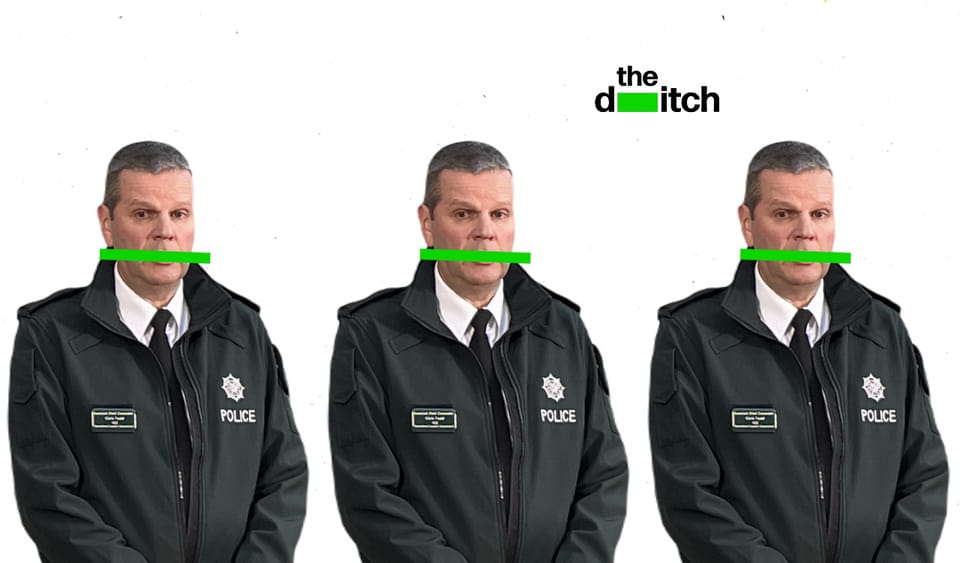By Rachel Connolly. Originally published in The Ditch's State Failures.
I love stories of professional incompetence in a data protection context. I find them fascinating. I know that data protection sounds extremely boring, extremely unfascinating. But I’m thinking of stories about spies accidentally leaving their briefcases full of top secret government records on the train. Or the anecdotal tales I hear of lawyers or financiers forgetting to collect their laptops when they go through security in the airport, triggering huge panic because the banking information of vast business accounts is now irreparably compromised. These stories show that, in the end, no level of technological sophistication can truly mitigate human error.
Recently a friend told me one about someone they knew who worked in private equity who sent an email calling an important client a swear word. He meant to send the email to a colleague in his own company and instead typed in the address of the person the email was about and clicked: Send! He actually managed to fix that one. He sent an email with the same subject heading to the client 1,000 times and then called the client, said there had been a malfunction and asked could he delete all emails he had received with this certain subject heading. The client did it and never noticed the one with the swear word.
The PSNI had no such solution available during a data breach over the summer, a tale of such extraordinary incompetence that, despite my tendency to seek out these kinds of stories, even I could barely comprehend it when it first broke. On the 8th of August, in response to a routine freedom of information request, a member of the PSNI accidentally published a spreadsheet containing the personal information of over 10,000 officers and other staff members. The spreadsheet held their surnames and initials, as well as their ranks and grades and the locations where they are based (although not their home addresses). It was online for about three hours before someone noticed and took it down. Some of those on the spreadsheet were employed secretly, not even known as PSNI workers by their own families. There’s no saying whether it was copied in that time, nor how many times if so.
This would be a grave mistake for any police department, but in the north, where paramilitary and gang activity is still rife, it is hard to overstate the scale of the mess they have made for themselves. Or the potential danger they have placed their employees in.
'The argument was that state violence against Catholic communities was justified'
As with much in the north, there is a sectarian bent to this too. The PSNI was formed in 2001, intended as a replacement for the controversial RUC and a new start for a society trying to move forward after the Good Friday Agreement. Policies enacted by the British state and carried out by the RUC and the British army during The Troubles – such as the violent policing of protests and internment – were used overwhelmingly against majority Catholic communities. The argument was that state violence against Catholic communities was justified by IRA violence, but the devastation wreaked by loyalist paramilitaries never seemed to warrant a similar treatment of Protestants. (A thorough accounting of this can be found in Making Sense of The Troubles by David McKittrick and David McVea).
Hence the RUC was widely considered to be biased against Catholics, particularly working class Catholic communities. The credibility problem caused by this long, verifiable history of unfairness has not been improved by recent reports verifying rumours of collusion between the RUC and UDA in various murders. (In my experience conspiracy theories in the north are often revealed, in the long term, to have been right).
When the RUC was dissolved, the idea was that the PSNI could shed the RUC’s baggage. It would be fairer and therefore more credible. But some of the old problems persist. For some years the PSNI pursued an affirmative action hiring policy, seeking to work towards employing 50 percent Protestants and 50 percent Catholics. They never managed it and the target has since been abandoned. The latest survey shows that Catholic officers born in the north account for just over 26 percent of the force. (Catholics make up 42 percent of the population in the north).
A problem like this can become self-reinforcing, rather than being maintained entirely by design. I never heard anything positive about the PSNI growing up. My perception of it was a force mired in conspiratorial practices and bigotry. This was normal for other Catholics I know too. My sense, too, is that suspicion around the PSNI fosters a broader anti-police sentiment in Catholics, which I suspect makes many less likely to consider policing as a career path. There is no available data on the proportion of job applications that come to the PSNI from Catholics, but I would be surprised if it is close to 40 percent. The incentive to join anything that you feel has systematically and deliberately discriminated against your identity group is not high. (Though some people do revel in being granted the opportunity to join country clubs they would have been excluded from a generation before. So it’s not zero).
Still though, whether by accident or design, the relative scarcity of Catholics in the PSNI, and the force’s reputation with Catholics, has left Catholic officers particularly exposed by this incident. One man, from west Belfast, gave a moving interview to the Sunday World. “It was a big decision to join the police as a Catholic. It was a hard decision, but we were told that it was a good career, and it is. But now I think it was the biggest mistake of my life,” he said. “What is more infuriating is the response or lack of in certain areas. I have been offered cameras and security lights. How is that going to look? My neighbours who think I work in administration at a building company would put two and two together. I would.” He’s not alone in his frustration. In October more than 800 PSNI officers and other employees lodged High Court proceedings against the service and its handling of the incident too.
There’s more to this incident than the normal data mishap stories I follow. Here an accidental human error has compounded a much more deep-seated structural problem, one that I’m not sure the PSNI will ever solve. Certainly, this hasn’t helped. I have thought back to my own perceptions too. Strangely this kind of blithe incompetence actually sits out of sync with my impression of the PSNI – I have tended to assume wrongdoing on their part is the result of calculated and sustained intent. Actually, I have to say that my first response to reading this news was: there is no way that was an accident.
But then there was another story a few weeks after that one. This time a PSNI officer had left some paperwork and a laptop on the roof of his car and forgotten about it. When he started driving he scattered it all over the motorway. The force admitted this paperwork included the names of 42 officers and staff members, though it denied any of those involved were those deemed high-risk following the first data breach. Sometimes people just do stupid things.
Rachel Connolly is a London-based journalist from Belfast.


